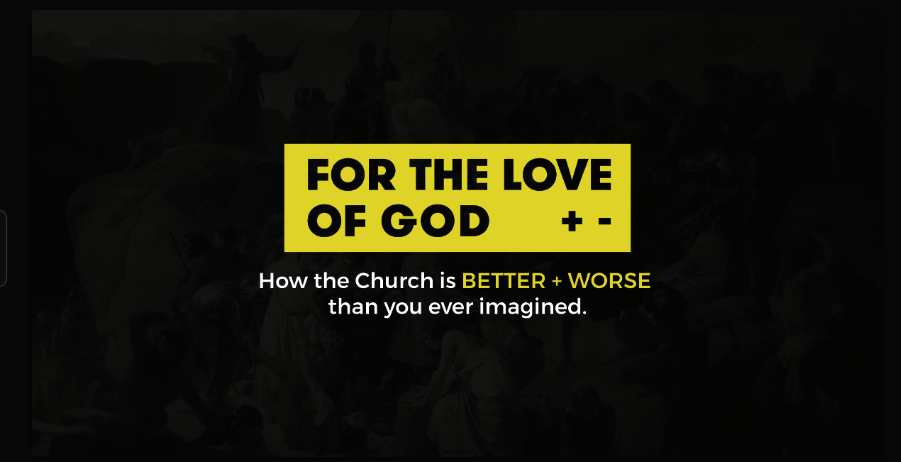November 22, 2018
I’m the bad guy? How did that happen?

The incredulity on the face of recently divorced, recently fired William Foster’s face when he utters those words in the classic movie Falling Down, sums up what many Christians feel in the current cultural moment.
After turning rogue and becoming vigilante for a day, railing against injustices perceived and real, Foster comes to the end of the road (or the end of the pier in his case) facing a police officer holding a gun.
“I’m the bad guy?” he asks, in a moment of rare clarity.
“Yeah,” says Robert Duvall’s police officer evenly, pointing a gun at his chest
“How did that happen?”
We’re the bad guys? How did that happen? Too often for evangelical Christians – among others – in Australia and beyond, that’s the question being asked.
It’s not simply that we moved from being the slightly cute do-gooders who offered spiritual milk and cookies, to those whose ideas have been described in mainstream media just this past fortnight as cruel and dangerous. That would be enough in itself. It’s that, like it did with William Foster, it all happened so quickly. Family guy with a job one day. Friendless fugitive on the run the next.
No sooner were we moving from the language of “sin” to the softer language of “brokenness” describe sexuality outside of biblical parameters, than even that word, and its semantic field, was viewed with deep hostility too.
“Broken” become the tip of the conversion therapy conversation; it’s a red flag to anyone on the look out for coercive and damaging attempts by churches to promote change in a person in areas that the culture now claims is inherently unchangeable. In fact, methodologies aside, the very attempt to do so is itself viewed as coercive and damaging.
So no sooner had we self-declared, non-crazy Christians gone “Phew, that’s not us!” and told all who would listen that conversion therapy was the domain of a few slightly weird churches deep in the hills somewhere that we’d heard of them, but never attended, than Bible Study material, pastoral care, and prayers, were being labelled as conversion therapy too.
Even our politicians have weighed in using the language of ‘extreme” to describe the views held by many Christians, that until about yesterday, were considered unremarkable.
No doubt there will be a few readers of this blog who will offer their own perspectives as to how it happened, some of which can be batted aside with, you know, actual evidence to the contrary, but still, it’s disconcerting.
‘Fessing up to your faults is one thing, and the culture is ready to hear us do that. Plenty of people are happy to watch a scary movie that shows how bad the church has been in the past, as the commendable Australian documentary For the Love of God does.

Of course that same documentary showcases how the church has been far better than most people have ever thought too. While I appreciate the vision behind this, and as with all Centre for Public Christianity material, it is thoughtfully envisioned and excellently produced, I’m not sure the church actually is far worse than many people imagined, because this past year an often hostile media and an ugly activism, have combined in a pincer-move to take imagination out of the equation.
Even those virtues that the church has fostered, (the “better” bit) including human rights and non-violence are now being wrested out of our reluctant hands. Indeed such virtues, on the face of it, not only exist independent of the church, but actually seem to thrive!
The arc of history is bent towards justice – and a churchless justice at that. A now confident progressive secular frame can announce a vision of the good life completely independent of the church, and our feeble protestations look exactly that.
It’s a bit like that slightly overused term “Christian ethos” to describe the vibe of a school. The best secular schools know faith-based schools do not have a monopoly on “good pastoral care”, “the whole person”, or “community”. And they’re starting to say so.
And in the wake of the furore in Sydney’s Anglican schools recently, who could blame them for assuming that the ethos baton has been handed on to them, minus the ethics that so weighed us down?
“Thanks for looking after that for us,” the culture says with a firm smile “Now let us take it out of your hands, and we’ll show you how to use it without hurting people.”
And of course, our efforts at showcasing the vision of the good life we espouse is predicated on such a vision being a shared one. Yet clearly there’s no consensus any longer on what that term actually means, other than the observation the version offered by the church no longer has cultural traction.
That gets to the heart of the better/worse thing for me. In a great irony, the church has historically been better at precisely those times the world has considered been worse. In other words its most prophetic moments And this is one of those times.
In a sense it’s our Cassandra moment, never to be believed until the unthinkable happens. Hence the prophetic call out by the church to a culture racing helter-skelter for the sexual precipice is viewed by the world as the church at its worst, when, looking back from the vantage point of sexual wreckage in several decades time, it may well prove to be one of our finer moments.
In short we don’t need the patronising approval of a talk show host eulogising us for a mea culpa that’s a day late and a dollar short. Perhaps if we’d been leading the pack, exposing the issues in our midst before someone else did, we’d have something urgent and real to say.
Hence when the Parliamentary apology for historic sexual abuses in the church follows hot on the heels of the media storm over faith-based schools being accused of discriminating on ethical grounds against gay students (mostly incorrect), and staff living in homosexual relationships (mostly correct, but grading on a curve), it leaves us like the polar bear on the melting ice sheet; little room to move and less room all of the time.
Result? Protest too much if the boot is laid in too heavily, or if a particular wrong in a particular ecclesiastical time and place is generalised, and it’s read as the whining of the of the privileged kids who have to share their toys.
Yet, as I said, it’s not the fact of change that’s causing so much consternation, but rather the rate of change. And an unprepared Christian church and ill-equipped Christian institutions assumed cable car rates of change. Little surprise that so many have experienced existential motion sickness on the ensuing roller-coaster ride.
Hence this comment today from a friend working in a Christian school here in Australia in light of the impending discrimination legislation surrounding religious freedoms, and who gets to determine what ethical communities can or cannot espouse:
A lotta christian schools about to go down methinks. Either that, or we roll over and accept the changes. I’ve been saying it at for 3 years, but I’m not in any position where people will listen. We are over the precipice. I suspect panic will set in as that realisation comes.
And when I commented that the alternate may be less overtly Christian schools that may lead to a mass exodus of committed staff he observed:
In one way, I hope for closure rather than exodus. Al least with closure it indicates a refusal to compromise orthodox Christian belief. With exodus, you know the institution has ‘bowed down to the golden image of the king’, to borrow a phrase from Daniel.
Of course the cold comfort is that those who have bowed down to the image of the king will find that the pace of change catches up with them eventually.
Once you decide that your best survival tactic is to keep apace with the change, you only realise later that you’ve signed up to a race that will always increase in pace and will never end. Same sex marriage is so yesterday after all.
So no sooner had the dispiriting exodus by many former mainstream evangelicals occurred, those who announced in grave tones across the blogosphere that the new marriage orthodoxies were actually of God all along, than the next round of sexual orthodoxies gathered a head of steam. Where do they get off? Where can you get off, if acceptance by the culture at any costs is your priority?
They should have learned the bitter lesson from the secular academies, in which the once edgy, hip professors have found themselves cowed and bewildered by the often hostile, and implacable heresy hunters. Teaching in such settings must be a thankless task. The revolution that was launched by killing its children, is being rewarded by being consumed by its next generation.
None of this is to say there are easy solutions at hand. As with a hostile pace bowler on a bouncy cricket pitch the first task is to get your eye in, assess the situation and not panic. Wild swings and misses will likely do you in, as will cowardice.
It may well be that the solution is to do what all seasoned batsmen have done when facing genuine speed that can inflict damage: go back to the basics, maintain the technique you learned in the nets, and above all, don’t panic.
Written by
There is no guarantee that Jesus will return in our desired timeframe. Yet we have no reason to be anxious, because even if the timeframe is not guaranteed, the outcome is! We don’t have to waste energy being anxious; we can put it to better use.
Stephen McAlpine – futureproof
Stay in the know
Receive content updates, new blog articles and upcoming events all to your inbox.


